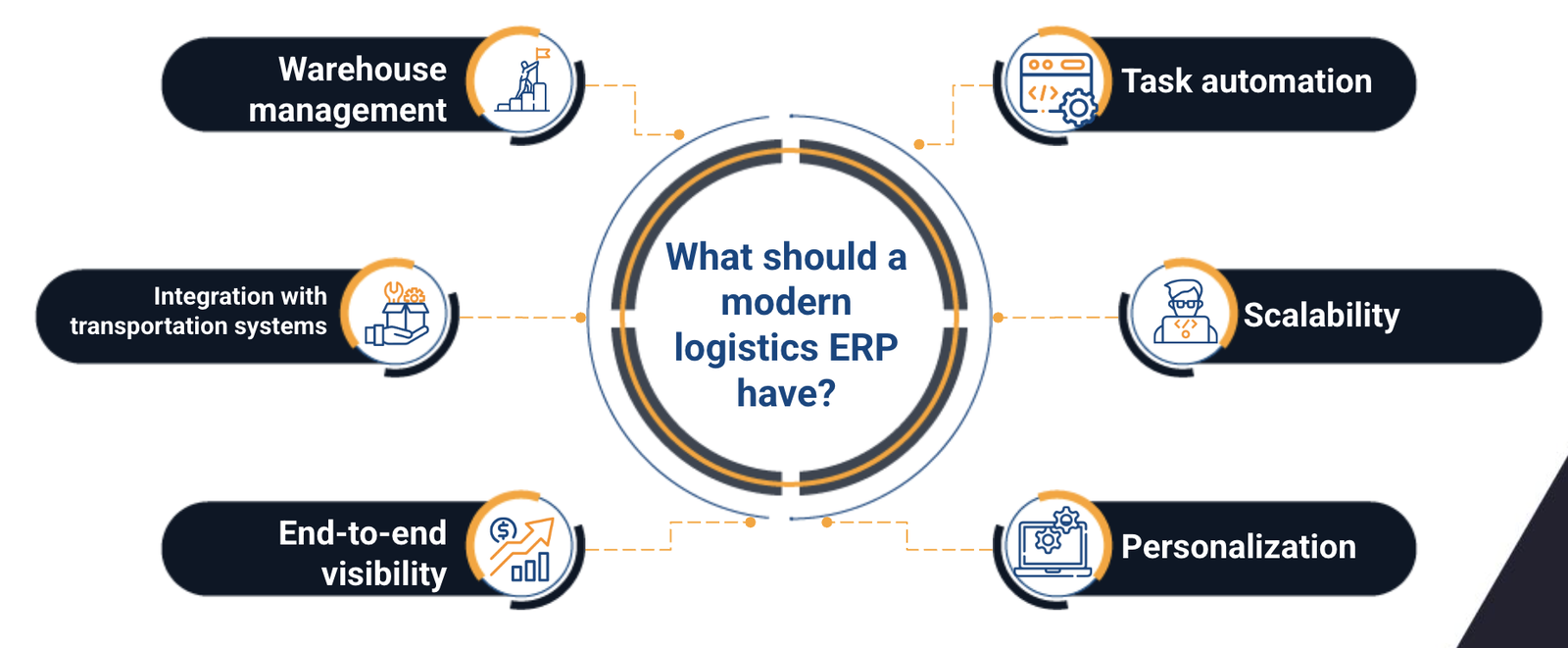
ERP software for the logistics industry: What to expect in 2025?
Table of contents
Quick Access

Digital transformation has taken a strong hold on the logistics industry, and one of the key tools for staying competitive in an increasingly demanding environment is ERP software for the logistics industry.
By 2025, these solutions are expected to evolve further, integrating emerging technologies such as artificial intelligence, predictive analytics, and advanced automation.
But where do you start when you're not clear on what an ERP is, how it works, or what real benefits it can bring to your business? This article aims to serve as an introductory guide for business leaders seeking clarity in the world of logistics software development.

What is an ERP and why is it important for logistics?
According to DHL, one of the global giants of transportation and logistics, the ERP system, or Enterprise Resource Planning, is a central tool that ensures cross-functional support for all of a company's business processes. It integrates modules for sales, controlling, production, purchasing, human resources, and asset management.
Furthermore, the data provided by ERP software for the logistics industry can be used to calculate key performance indicators (KPIs) and achieve strategic goals. It also helps save time, reduce costs, and optimize business workflows.
In short: an ERP is not just a system, but the backbone of a modern, well-structured company.
ERP adoption by industry: Where does logistics stand?
According to a survey published by SelectHub, the sectors where ERP is being implemented the most include:
- Manufacturing (47%)
- Distribution (18%)
- Services (12%)
- Construction (4%)
- Retail (3%)
- Utilities, Government, Healthcare (3% each)
Although manufacturing leads the way, logistics is closely linked to distribution, placing this industry in a key position to take full advantage of ERP software for the logistics industry.
Furthermore, functionality is paramount: 40% of surveyed companies consider ERP functionality to be the deciding factor in their selection. This reinforces the importance of choosing a solution well-adapted to their logistics challenges.

What should a modern logistics ERP have?
When planning logistics software development or evaluating an existing ERP solution, these are the must-have features for 2025:
- Advanced Warehouse Management
It provides real-time inventory insight, automates replenishment, and improves product traceability. - Integration with Transportation Management Systems (TMS)
Logistics doesn't end at the warehouse. The ERP must integrate with systems that manage routes, monitor deliveries, and control fleets. - End-to-End Visibility
With customized dashboards, leaders can make real-time decisions based on KPIs and consolidated data from across the entire operation. - Automation of Repetitive Tasks
From invoice generation to order tracking, ERP can automate workflows, saving time and resources. - Scalability and Customization
Every logistics operation is different. ERP software for the logistics industryThe logistics industry must allow for customizations that adapt to the reality of the business and scale as the company grows.

Use case: Logistics transformation with a custom ERP
Let's imagine a mid-sized transportation and warehousing company in Latin America with operations in three countries and hundreds of daily movements between distribution centers.
Previous Challenges:
- Fragmented systems for accounting, inventory, and operations.
- Lack of visibility into delivery status.
- High costs due to human errors in inventory management.
- Difficulties in demand planning.
Solution:
A custom ERP software for the logistics industry was implemented, which integrated:
- A warehouse management module with QR code scanning.
- Automated delivery report generation.
- Centralized dashboards with logistics KPIs.
- Connectivity with e-commerce platforms and transportation systems.
Results in 12 months:
- 30% reduction in inventory errors.
- 20% savings in operating costs.
- 45% improvement in customer service response times.
- 100% real-time visibility into deliveries.
This case demonstrates how well-focused logistics software development can generate a positive and measurable impact on a company's operations.

Logistics ERP trends for 2025
Companies looking to adopt ERP software for the logistics industry in 2025 should be prepared for the following trends:
- ERP with Integrated Artificial Intelligence:
Systems that learn from data and recommend actions to optimize logistics processes.
“These AI-powered systems can automate routine tasks, provide advanced data analysis and forecasting, and improve decision-making. The goal of AI in ERP is to improve operational efficiency and optimize business processes,” IBM explained in an article. - Cloud-first and Mobile Accessibility:
Remote management from anywhere in the world, ideal for multi-site operations. - Advanced Cybersecurity:
Protection of sensitive data through multi-factor authentication and end-to-end encryption. - Interoperability with IoT:
Integration with sensors in warehouses, vehicles, and distribution centers for greater accuracy and automation.
These trends will not only improve efficiency but also position logistics companies to compete in a globalized environment.
Where to start?
Choosing the right ERP can be a complex process. Here are some key steps:
Internal diagnosis: Identify which processes need to be optimized.
Define clear objectives: Reduce errors? Increase visibility? Speed up deliveries?
Evaluate providers with logistics experience: Not all ERPs are the same.
Consider custom solutions: Logistics software development can be more effective than a generic solution.
Seek scalability: Think of a system that grows with you, not one that limits you.

Rootstack: A trusted provider for your logistics ERP
At Rootstack, we have extensive experience in logistics software development, including the creation and implementation of ERP solutions tailored to industry-specific needs.
Our team has worked with transportation, distribution, and retail companies, providing innovative solutions that transform operational processes and optimize overall performance.